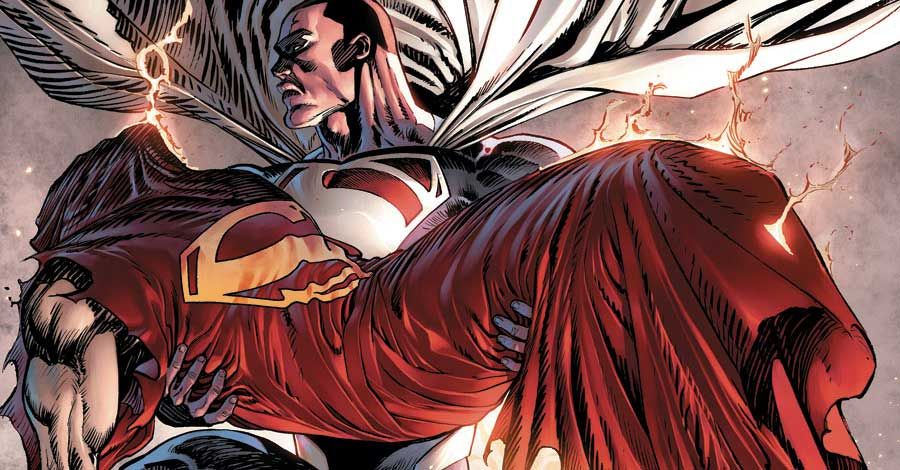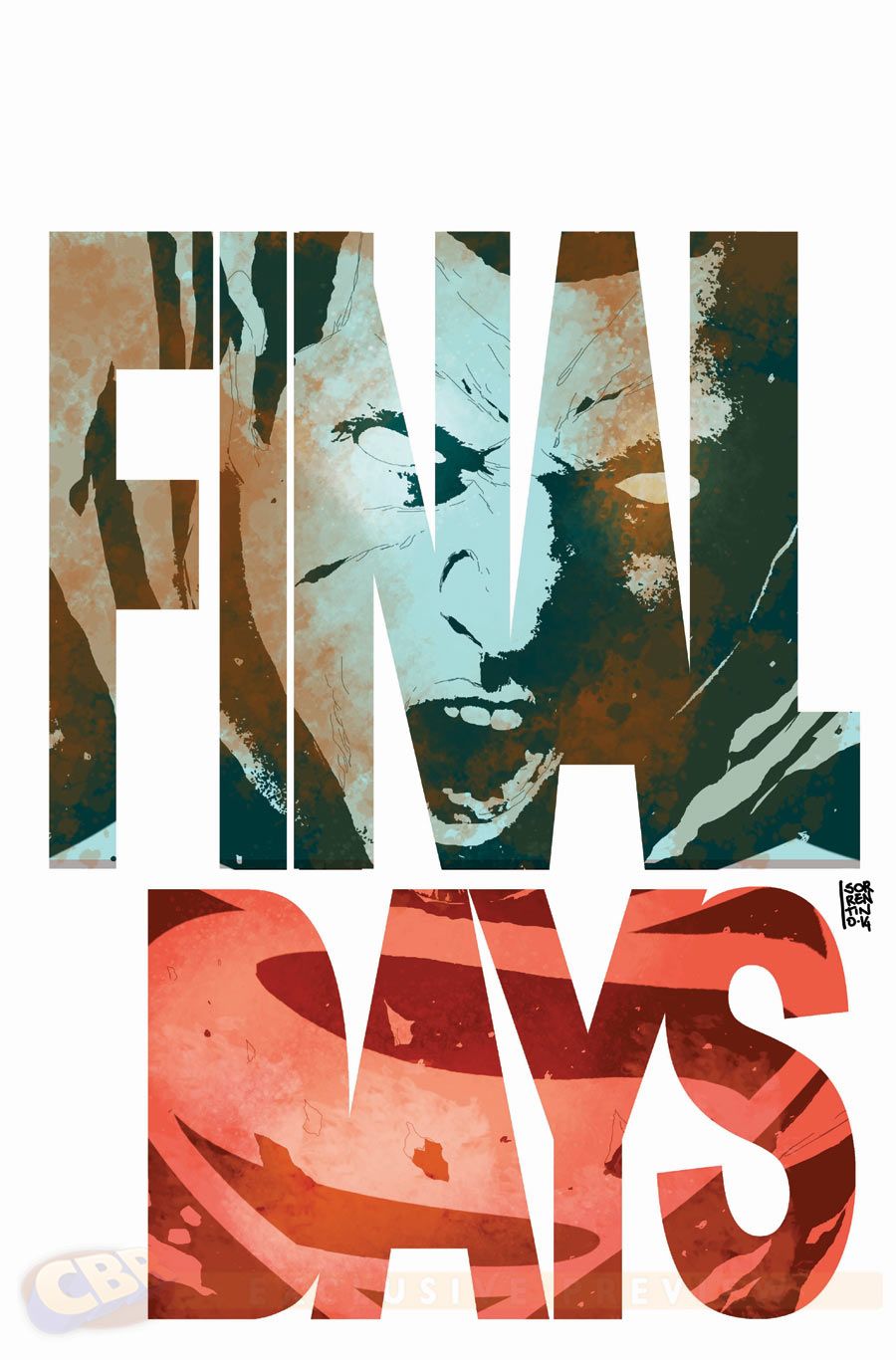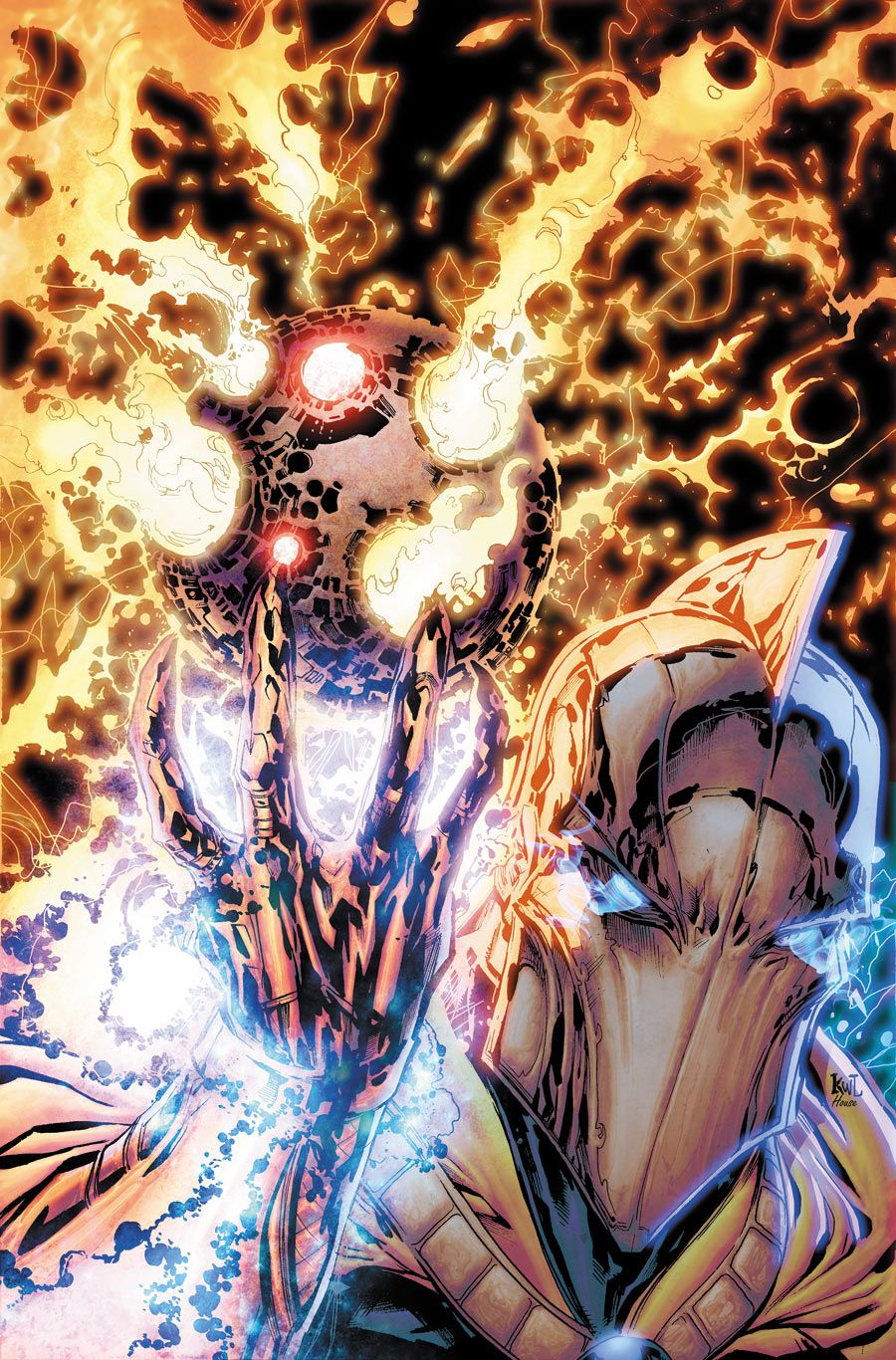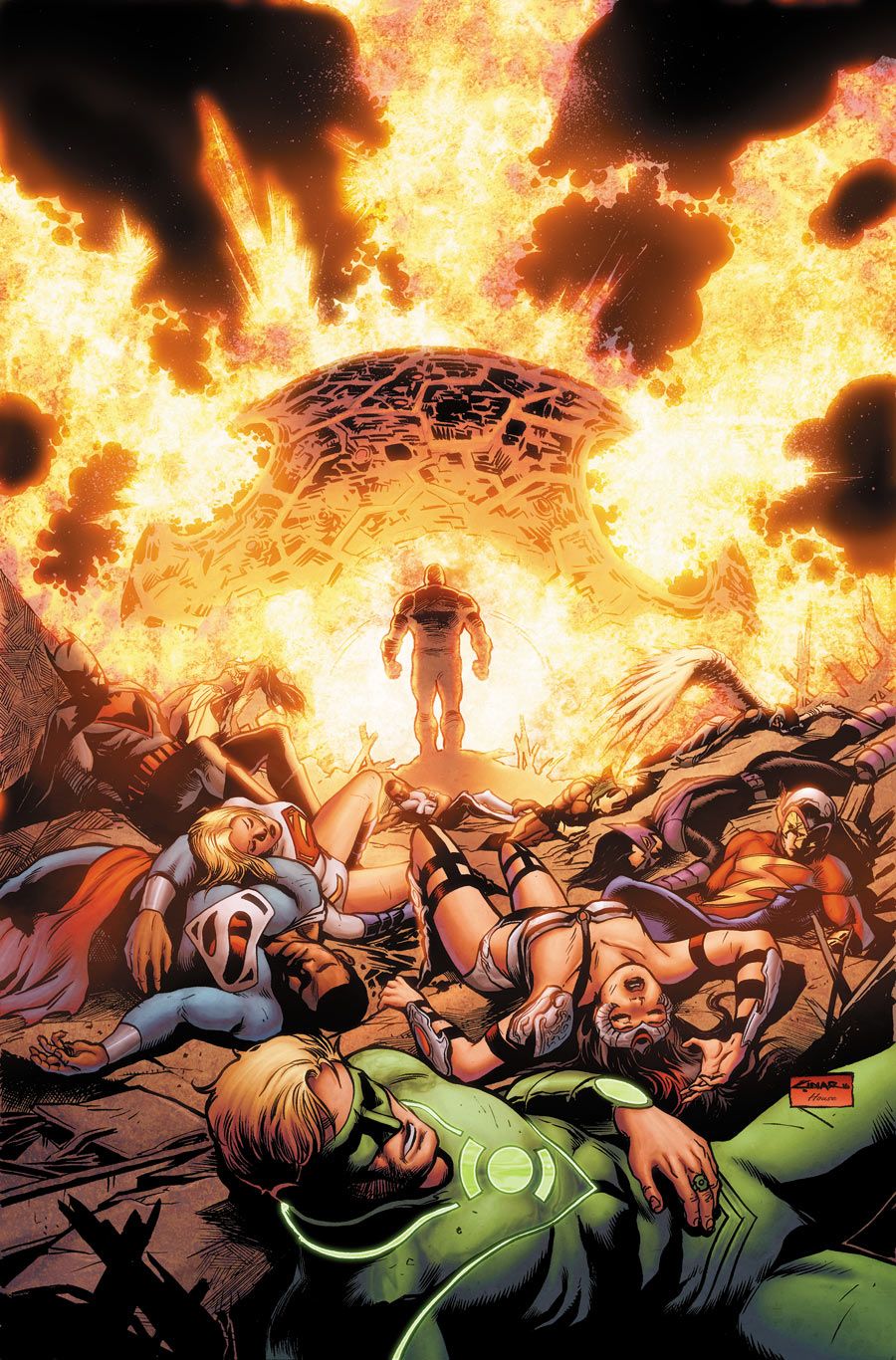There really is no secret when it comes to "Earth 2: World's End," according to novelist Daniel H. Wilson -- it's all right there, in the title. It's the end of Earth 2, as we know it, and the writers feel fine. Well, Wilson, Marguerite Bennett and Mike Johnson might not feel 'fine' about it, but they're the ones unleashing the New Gods and the combined forces of Apokopolis on the superheroes of Earth 2 so they must be okay with it, right?
The writers spoke with CBR News about the recent events of the weekly series. The title of Issue #15's story was "Sacrifice" and that sums up quite accurately recent developments in the lives of Clark Kent, Al Pratt, Alan Scott and Amar Khan, to name but a few.
The creative collaborators have also joined forces on the last few issues of the "Earth 2" ongoing, as the entire DC Universe moves closer and closer to "Convergence," the line-wide event series, which launches in April.
RELATED: DiDio Dishes "Convergence" Details, Talks "Multiversity" Connection
Wilson, who joked that he is enjoying the extra writing assignments as he's poised to end his first major comic book project and return to his life as a roboticist-turned-New York Times best-selling writer, says that he had an instant connection with Mister Terrific, which makes sense as both are brilliant scientists. Meanwhile, Bennett has found that she loves writing the world's finest of Earth 2, Huntress and Power Girl, while the unlikely pairing of Ted Grant and Dick Grayson has sparked Johnson's creative fires.
With such a large cast, the writers have each carved out their own corner of the universe. Now, with "Convergence" -- and the end of Earth 2 -- only a few months away, things are going to start coming together very quickly, and they can't wait for readers to see what happens before their big finale.
CBR News: When the final fate of Earth 2 Clark Kent was revealed, I immediately started to think of all of the other sacrifices characters have made in this series -- from Clark Kent to Al Pratt and from Alan Scott to Amar Khan. And when I read the final page, the title was revealed: "Sacrifice." Why does sacrifice work so well as a creative tool and how does sacrifice drive the narrative of "Earth 2: World's End?"
Daniel H. Wilson: In "World's End," it's pretty clear what's going to happen, based on the title of the series. [Laughs] So what we're really getting at is this notion of what's important. At the end of the world, what is it that you really save? Your house is burning down, you run in, what are you going to grab? And pretty quickly, you realize that it's not things. In this case, we're taking it to an extreme example -- potentially the whole planet. The story really becomes about people and relationships and I think that's why we see this behavior out of our characters because they know what's important and they're fighting for each other. That's what's worth fighting for, each other. And by the way, that scene with Clark was all Marguerite. She really covers those characters.
Mike Johnson: Like Daniel said, it's right there in the title. It's the end of the world, and as writers, the end of the world means anything goes. Anything can happen to any character. It's sets up this great momentum as we get to the second half of the series. For the people that have survived, it becomes that much more intense. You're watching heroes fall, and it's up to the ones that survive to save what's left of the world and rescue as many people as they can. It just adds to the impact overall.
There's a great line from one of my favorite characters, Michael Holt, in #14. He is devising a plan with Mister Miracle and Fury involving the T-spheres, and when he gets pushed about his rationale, he responds, "It's always a good time for science." Obviously, boom tubes and T-Spheres are fictional devices, but when humanity is pushed to the brink of extinction by the New Gods, why does it make sense for humans to resort to pure science and good, old-fashioned human ingenuity to fight back against their oppressors?
Wilson: Mister Terrific is one of the characters that I primarily script. I have this background as a roboticist, and at some point earned a degree in robotics. I was going to be a scientist, but then I started writing fiction, too. For me, it's a real treat to write Michael Holt. I love his perspective on the world. He's looking at the abilities that these gods have and trying to figure them out. He wants to figure out how to recreate those abilities. To me, it speaks to this basic theme about humanity. We build tools in order to gain more power, and we can use the power for good or evil. In this series, that really plays out with Terry Sloan and Michael Holt. They're both scientists, and they're both trying to figure out how the New Gods work, and they'll each use that knowledge for different reasons.
Michael Holt sees humanity being on a path towards reaching where the New Gods are. He's essentially giving humans god-like powers by trying to re-create what the New Gods can do. That all started before our series. That started when Bedlam put Mister Terrific in a room with Sloan [in "Earth 2" #26 by Tom Taylor] and said, "Build me a boom tube that can transport a planet." He's also always been a traveler through the Multiverse. I really love the natural curiosity that he has and also the optimism that he has. In a lot of ways, the New Gods take these abilities for granted. And he doesn't. He's really looking into how they work and how they can be re-created.
Marguerite Bennett: I think a reason that Sloan really works is that he is coming up with human solutions to superhuman threats. He's really a spokesperson for the good or evil that pure human ingenuity can create.
When the series was announced and the first bits of information about "Earth 2: World's End" were revealed, I immediately thought the threat against Earth 2 would be technology gone wild and/or technologically corrupt monsters. What do the New Gods represent in terms of a superpower out to destroy humanity?
Wilson: I think the New Gods represent deep, ancient, interesting mythology. The three of us have been collaborating on the "Earth 2" monthly series too. We just did an issue with Doctor Fate and we really started to look at Apokolips, archeologically. How many different cultures have made an impact on this ancient planet? And how many different races have been conquered? How many different alien architectures and treasures and tools have been appropriated by the New Gods? The vast, ancient history of Apokolips and the New Gods is really fun to think about. It's also really fertile. It gives you a lot of places to go with the story through spectacle, and it's fun coming up with monsters and weapons. It's really this inexhaustible supply of awesomeness, in my opinion.
Johnson: It's almost like Norse mythology, and the idea of Ragnarök and deities going to war. It gives the story this huge, epic weight. But we also have human characters that we care about, like Dick Grayson and Michael Holt and even the metas, the heroes themselves, in this face of this huge mythology -- it's an amazing place to tell a story.
One of my favorite weekly series from DC Comics was "52," which chronicled the events of a year in the DCU without the Big 3 -- Superman, Batman and Wonder Woman. In this series, you have the Big 3's Earth 2 counterparts, as well as Alan Scott, Jay Garrick and Al Pratt and a host of other Earth 2 superheroes that all have a long history in DC Comics, but certainly not at the level of DC's A-listers. Does the lack of the heavy, heavy hitters allow for more creative freedom in terms of storytelling?
Bennett: Yes, I think so. Absolutely. You're allowed to play with relationships, especially. To really distort and get the maximum of crisis and conflict from relationships on Earth Prime would have been sacrosanct. It allows you to define characters by pushing people to their limits knowing that they can betray certain ideologies, knowing that they can grow and change in ways that have made them iconic on Earth Prime. It's a really wonderful playground where you get to experiment.
Wilson: It's interesting that the New Gods are so powerful. In a lot of ways, that actually helps with the emotionality of the story. They are so powerful. They're not really going to kill each other. They really are ruled by their emotions, which I love. It's kind of the ironic fact about these gods. They are very human in regards to how emotional they are. And when we get into Miracle and his relationship with his dad -- [Laughs] These guys can wreck entire planets, they have these very human, father-son interactions. And that's very relatable to a reader that's a human being. I like that there is a common ground between very powerful characters, all the way down to our characters that we think of as on the ground like Dick Grayson and his family.
Johnson: I'd say the other characters that have been really fun to write are the avatars that represent our Lantern Corps, especially Solomon Grundy, who I never imagined writing as a heroic, in his own way, character. Teaming him up with Alan Scott and the other avatars has been really fun and not just because of their different personalities but because of their different abilities and their cool designs. The artists have been doing an amazing job throughout the series with anything that we've throw at them. We always get back these incredible images.
It's always impossible to choose your favorite child, but with so many moving parts, characters and story beats in "World's End," is there a character that's really surprised you as you have explored his or her journey? And conversely, is there a character that you feel we should really keep our eye on during the second half of the series?
Wilson: Michael Holt and Terry Sloan have been my favorite major characters. I love how they are two different versions of the same guy. In terms of characters that have unexpectedly been a real treat, I would to say Jimmy Olsen and Dr. Crane A.K.A. Robotman. [Laughs] They have been really fun. I love the transformation that Jimmy has taken. And I am really looking forward to playing with him as a character in the future and seeing where all of his interaction with the Mother Box technology is going to take him.
Bennett: For me, it's Huntress and Power Girl. I just love their dynamic. I love the loyalty between them, the trust between them. I wholly and truly feel that Power Girl and Huntress and are the Superman and Batman of Earth 2. Thomas and Val are different entities but as far as taking up the mantle of what these legacies could be, Kara and Helena are the people for the job. The Furies are also really delightful. They are so weird and so crazy.
Johnson: I love working with Dick and Barbara Grayson. And also Ted Grant. He finds himself in this horrible situation with moon chunks falling from the sky and Ted says, "Let's focus. Let's not lose our minds." [Laughs] He punches people he likes. He punches people he doesn't like. He punches everybody but he's truly a rock in the story, especially with Dick going through so much stuff. Writing Ted and Dick together is a like a funny, buddy cop movie.
As you said earlier, you're also writing the "Earth 2" ongoing series. How do these two titles tie together, and how will they dovetail into DC's upcoming line-wide "Convergence" event?
Wilson: We're definitely building towards a hand-off. "Convergence" will pick up all of the pieces that have been scattered and broken on our battlefield and will put them back into play and then run with them. But the way that those pieces are going to end up is not something that we can talk about right now. [Laughs]
As for writing "Earth 2," we wrote a weekly series together, so we are like soldiers in the trenches. Doing a monthly is completely natural. We're mostly finished writing "Earth 2: World's End," so it's nice to get a couple of more issues to work together and to let me down easy. [Laughs] It's hard to have [comic book writing] stop all of a sudden.
Johnson: Given the nature of all of the characters, it's nice to get more than three of four pages with each one. The monthly gives us more room to focus on individual characters.




